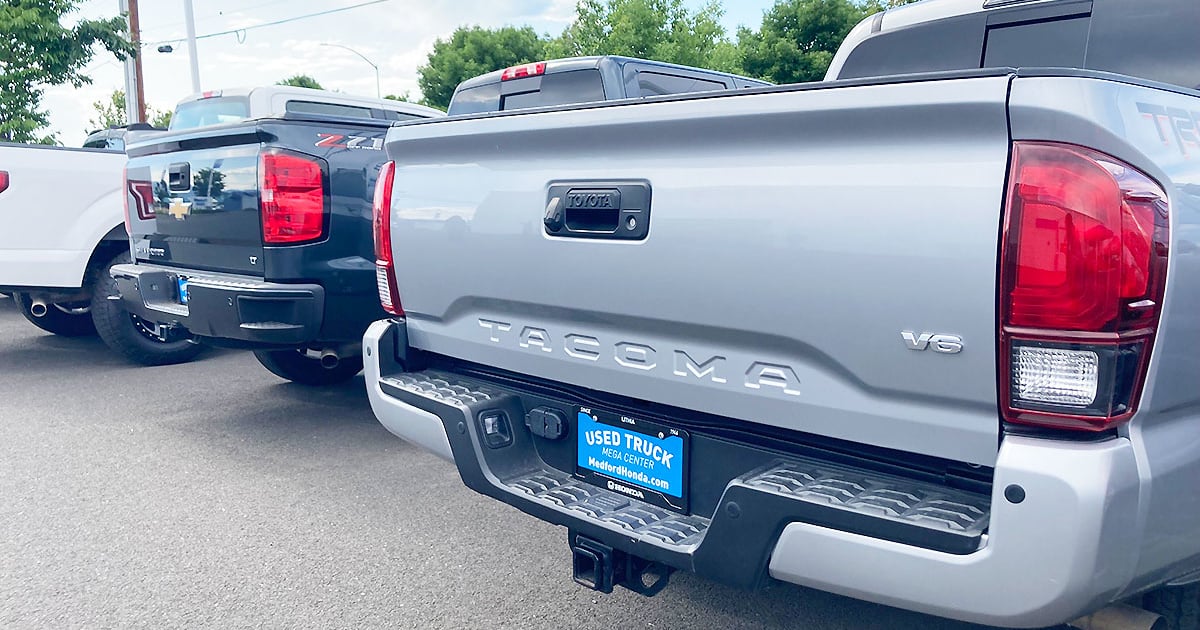
MEDFORD, Ore. — A Honda dealership in southern Oregon might not be the first place that comes to mind when shoppers hear the phrase Used Truck Mega Center, but Travis Hawes, general manager of Lithia Honda in Medford, has found the strategy successful in bringing customers in and expanding the business.
Lithia Motors Inc. has long credited its decentralized business model of allowing local general managers and operators to make decisions as a reason for its overall growth and success. And for a select group of high-achieving store operators, the auto retail giant has an award program, Lithia Partners Group, that means more autonomy for general managers and additional stock grants. The award is also a tool to retain top talent.
Hawes, a longtime Lithia employee, and the Honda dealership, just four miles from the auto retailer’s Medford headquarters, are two examples of what Lithia executives describe as a hands-off approach.
“You have to continue to reinvent yourself,” Hawes told Automotive News on a tour of the dealership last month. “You’ve got to find that new energy every month to create either a new campaign or go after new customers.”
For Hawes, reinventing himself took the form of Used Truck Mega Center, a strategy he developed and launched in fall 2020 when it became clear there were new-vehicle inventory supply constraints because of the pandemic but also a consumer desire for trucks.
“I went after trucks in a big way,” Hawes said, noting that he created a website, UsedTruckMegaCenter.com, directing shoppers to the Honda store website. “I spent $3 to $4 million just on pulling the trigger buying trucks at auction.”
The move grew the dealership’s used-vehicle business and used-vehicle market share, as sales of used trucks rose from 10 to 15 a month to 40 to 50 a month, Hawes said. And it spoke to Lithia’s business model.
“I didn’t have to go ask multiple layers of management to get this done,” he said.
Hawes said he buys used trucks from places such as California, Arizona, Colorado and Texas. At around $1,200 for each, shipping costs aren’t insignificant, but the investment is worth it, he said.
“That transport makes the margin very thin,” Hawes said. “But fortunately, I have a good finance team that we do very well on the back side.”
The dealership sells extended warranties and has found that shoppers typically buy one for used trucks.
“You might lose a little bit selling the car, but they buy a little warranty in the back and I maybe get a trade — it all works out,” Hawes said.
Even as new inventory levels at Honda dealerships improve, Hawes said the strategy continues, with rows of used trucks on his lot that sport blue and white license plates reading Used Truck Mega Center. A walk-through last month revealed multiple Ford F-150, Chevrolet Silverado and Toyota Tacoma trucks on the lot, and a customer taking delivery of a 2014 GMC Sierra pickup with around 180,000 miles on the clock.
Hawes said Lithia Honda sells an average of 50 new vehicles a month and around 100 to 150 used vehicles, of which 20 to 25 are trucks.
Lithia launched its partners group in 2015.
CEO Bryan DeBoer said a dealership has to be with the acquisitive Lithia for at least a year to qualify. Around 41 percent of stores qualify, and of those, only 15 percent win a Lithia Partners Group award in a year, DeBoer said. There are three levels, silver, gold and platinum, the highest.
“It’s our solution to not having ownership of your own store,” DeBoer told Automotive News. “They have liquid ownership of more company stock than a non-[Lithia Partners Group] member at Lithia. That’s something that has built massive amounts of wealth for our general managers.”
To help identify potential winners, Lithia relies on a store performance scorecard, a three-page summary that breaks down components of the dealership’s business and reveals trends. Measurements include sales efficiency and service effectiveness, Lithia COO Chris Holzshu said.
“We’re trying to perform for our customers,” Holzshu said. “And in the customers’ eyes, the manufacturers’ eyes and our shareholders’ eyes, all those things come together on the [scorecard]. You can see it very quickly.”
DeBoer said the performance scorecard aligns with manufacturers’ values and wishes but is tailored around customers in terms of loyalty and market share, which drive profitability.
“That’s about as deep as we ultimately want to get from an executive level, or even a presidential or vice presidential level in the field,” he said. “Our goal is for everyone, all business leaders, to get to become LPG members.”
The partner group dealerships are Lithia’s “best of the best,” Holzshu said.
“You might visit those stores once a year,” he said. “Let them do their thing and don’t screw it up.”
Lithia Honda has been a winner since the program began. DeBoer said members must continue to win a spot at least every three years.
Hawes, 51, most recently took the platinum award, in 2021. He has been general manager of the store since December 2011, but his tenure with Lithia goes back further.
After realizing being a police officer wasn’t going to be his career, Hawes decided to give auto retail a try. He started at the Honda dealership, which was at a different location in downtown Medford, in March 1996. A young DeBoer, then the store’s general manager, hired him as a salesman.
Hawes sold cars for three-and-a-half years, then moved into finance for the same amount of time. From there, he worked on Lithia’s dealership acquisition team during a spree that saw the company buying stores in Colorado, Texas and North Dakota. He returned to Medford to work at Lithia’s Saturn and Volkswagen dealerships before moving back to Lithia Honda.
“It’s been a fairly successful run in little Medford, Oregon,” Hawes said.

